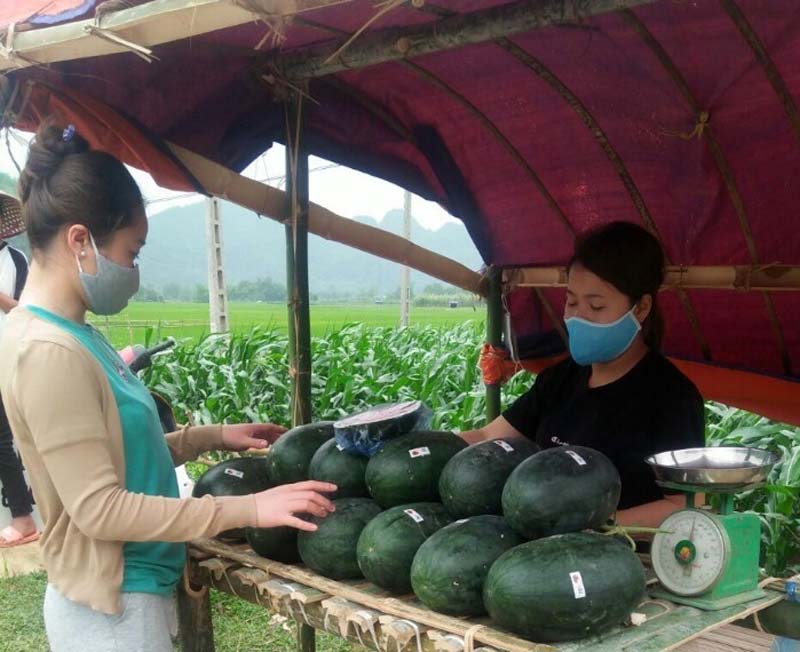
(HBO) - Watermelons have fallen in love with Mai Ha (Mai Chau) for a long time. Mai Ha watermelons are big, red and sweet so they been bought by traders everywhere. The local authorities and the people here want to build a brand for Mai Ha watermelons and gradually produce them according to VietGAP standards to bring Mai Ha watermelons beyond the locality.
 Mai Ha watermelons (Mai Chau) have been stamped with
traceability stamps, contributing to improving the product value.
Mai Ha watermelons (Mai Chau) have been stamped with
traceability stamps, contributing to improving the product value.
Since the beginning of April, although the people in Mai Ha
commune and the people all over the country have seriously taken the measures
to prevent Covid-19 epidemics, there is still a glimpse of the industrious
farmer who harvests watermelons in the fields of Chieng Ha, Kha, and Lau
villages of Mai Ha. From farmers, traders to retail customers, they always keep
the right distance and wear face masks. This year's watermelon season, the
farmers in Mai Ha have gained a good season. Watermelons are in a good season
with the best prices, and traders from Hanoi, Son La, Ninh Binh ... come to the
garden to collect them.
There have been 46 hectares growing watermelon in Mai Chau
district (doubling compared to that of 2019), of which, there are 42.16
hectares of watermelons in Mai Ha commune, the rest is grown in Van Mai
commune. The productivity is from 28 - 30 tons / ha. Currently, the wholesale
price of the watermelons in the garden range from 7,000 to 8,000 VND / kg. The
retail price is from 10,000 to 13,000 VND / kg.
Mr. Kham Thai Sau, the Chairman of the People's Committee of
Mai Ha says: Watermelons have been identified as the key crop by the Party
Committee, authorities and people of Mai Ha. The commune has been trying to
maintain the area of 40-42 ha for growing watermelons. This year, the greatest
joy of the watermelon growers and the whole commune is that Mai Ha watermelons
have been stamped traceability. Currently, there are more than 10,000
traceability stamps issued to the watermelon growers. We are aiming to
establish cooperatives to develop production according to the link chain. In
2021, we are trying to grow watermelons according to VietGAP standards to
enhance the product value, affirming the brand of Mai Ha watermelons in the
market.
It is required that melon growers must strictly comply with the
planning and care process according to VietGAP standards so that Mai Ha
watermelons will be available in supermarkets and the chains of clean
agricultural product stores across the country. In particular, it is necessary
to build the links between businesses and farmers in a chain and sustainable
production links.
Hoa Binh province’s economy posted an impressive Gross Regional Domestic Product (GRDP) growth rate of 12.67% in the first quarter of 2025, representing a 12.76% year-on-year increase, the highest rate recorded since the beginning of the current tenure, according to the provincial Statistics Office. This robust growth reflects years of strategic groundwork and sets a strong foundation for the province’s annual growth target of over 10%.
With a focus on cash crop farming with science - technology application and brand building, Lac Thuy district is gradually increasing production value, improving people's life quality, and laying the foundation for sustainable socio-economic development.
In recent years, the economic development model "Hoa Binh Earthworm Farm” run by Mr. Bui Van Dang in Co Giua Hamlet, My Thanh Commune (Lac Son district) has not only brought stable economic value but it is also environmentally friendly, helping to protect and reduce pollution, contributing to the construction of a green and sustainable agriculture.
Dao Village’s honey – a product certified with a 3-star OCOP (One Commune One Product) rating by Thong Nhat Agricultural Cooperative in Dao Village (Hoa Binh City) – is highly regarded by consumers for its quality, richness, and variety in packaging. The distinctively sweet taste of Dao Village’s honey leaves a lasting impression on anyone who has tried it.
In alignment with Project No. 07-DA/TU, issued by the Hoa Binh provincial Party Committee on November 1, 2021, Lac Thuy district has actively promoted investment and supported the sustainable development of its industrial and handicraft sectors during the 2021–2025 period. Alongside this, the district has remained committed to preserving and revitalising traditional craft villages.
Located in the northern part of Lac Thuy district, with a temperate climate and fertile soil, Phu Thanh commune has great potential and advantages in growing tea. The long-standing experience, combined with strict adherence to organic farming practices in the tea gardens, ensures that the dried tea products from Phu Thanh and Lac Thuy as a whole are sold out immediately upon production, providing a stable and prosperous life for the local people.



 Mai Ha watermelons (Mai Chau) have been stamped with
traceability stamps, contributing to improving the product value.
Mai Ha watermelons (Mai Chau) have been stamped with
traceability stamps, contributing to improving the product value.